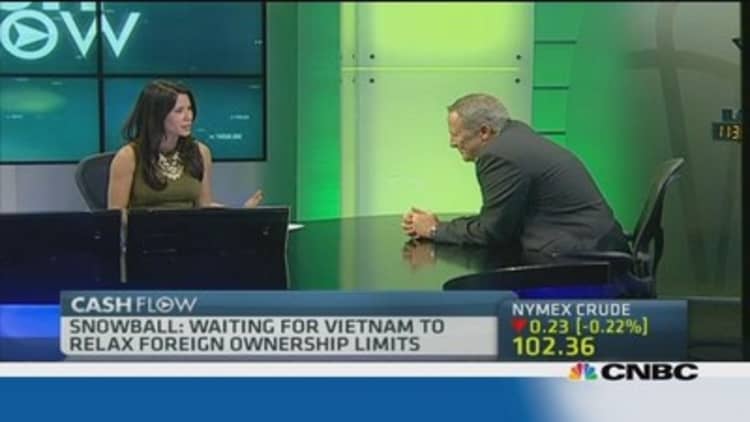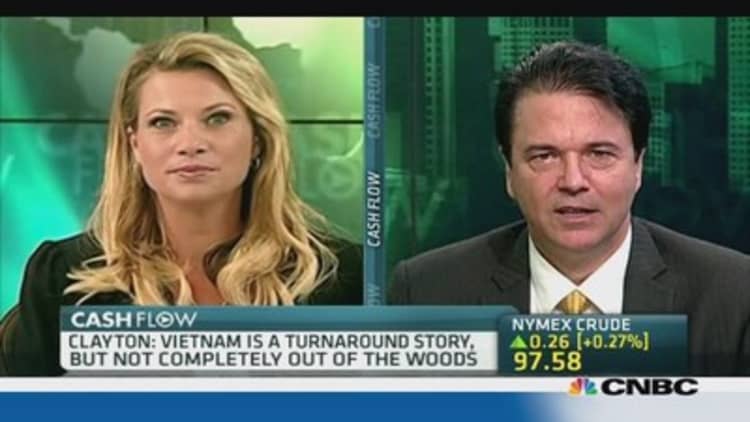
Bad loans continue to plague Vietnam's banks, with the magnitude of the problem remaining a mystery, but investors are continuing to push the stock market higher.
Vietnam's shares are attracting a lot of interest, with the benchmark VN Index tacking on 17 percent so far this year and 6 percent so far in February, but it's banking system looks worrying: at least 15 percent of banks' total assets are likely presenting problems, well above the 4.7 percent non-performing loan (NPL) ratio from the State Bank of Vietnam in October, Moody's said in a report last week.
(Read more: McDonald's goes East: McNuggets come to 'Nam)
"We do not expect significant improvements in the capitalization of Vietnamese banks in the next 12-18 months," Moody's said. "Capital remains inadequate to absorb the extent of potential losses stemming from pervasive weaknesses in asset quality."
While it noted the government had taken some constructive steps on the banks, regulators haven't implemented "decisive" policies to address the need for better accounting and transparency, Moody's said.
(Read more: Vietnam bets on loosening gaming laws to lure high rollers)
By way of comparison, China's banks, which have spurred concerns globally, saw their NPLs rise to 1.0 percent of assets in the last three months of 2013, according to data from regulators. But unlike the rally in Vietnam's share market, China's shares have trended downward for a year, partly due to concerns over the banking system.
China's government also has the resources – and some willingness -- to step in with financial help for troubled banks.
In Vietnam, "if they have to provide support, there's room. But it comes to the question does the government want to use public finances to support the banking sector and so far it's indicated it doesn't want to," Art Woo, an analyst at Fitch Ratings, told CNBC.
(Read more: The emerging market to watch in 2014)
But if Vietnam's banking system is wobbly, why are investors pushing up the stock market?
For one, not all investors believe the banking system looks as bad as the Moody's estimates suggest.
"The banking sector is improving," said Kevin Snowball, CEO of PXP Vietnam Asset Management, adding he believes NPLs are less than 10 percent of assets.
"We think it's on the way to resolution. A lot of collateral for these NPLs is in property and as the property sector begins to pick up that will assist in the resolution of these issues," he added.

In 2007, the country's property market hit a wall after peaking with a bit of a "flipping frenzy," which was crushed in the following years by double-digit inflation, lending rates above 12 percent and multiple devaluations of Vietnam's local currency, the dong.
Credit for developers dried up and the dong devaluation boosted the cost of imported materials and labor, leading to many abandoned projects.
Snowball also cites a few other factors boosting the market.
(Read more: Is it time to scoop up Vietnam properties?)
He expects the government will soon relax its limits on foreign ownership of companies, offering investors better access to higher quality stocks.
"We're also expecting further thawing of the privatization process so we'll see more access to a bigger market," he said.
"As limits are raised, there'll be more interest in the market and as markets achieve scale, that brings additional interest as well, so it begins to be a virtuous circle, hopefully," Snowball said.
Last month, in a bid to boost the equity market, the government also raised the trading band for stocks on the Ho Chi Minh Stock Exchange, the country's main stock market, to 7 percent from 5 percent, and revealed that it may increase the foreign ownership limits in some sectors - including consumer and brokerages, according to investment advisory firm GaveKal Research.
—By CNBC.Com's Leslie Shaffer; Follow her on Twitter @LeslieShaffer1

